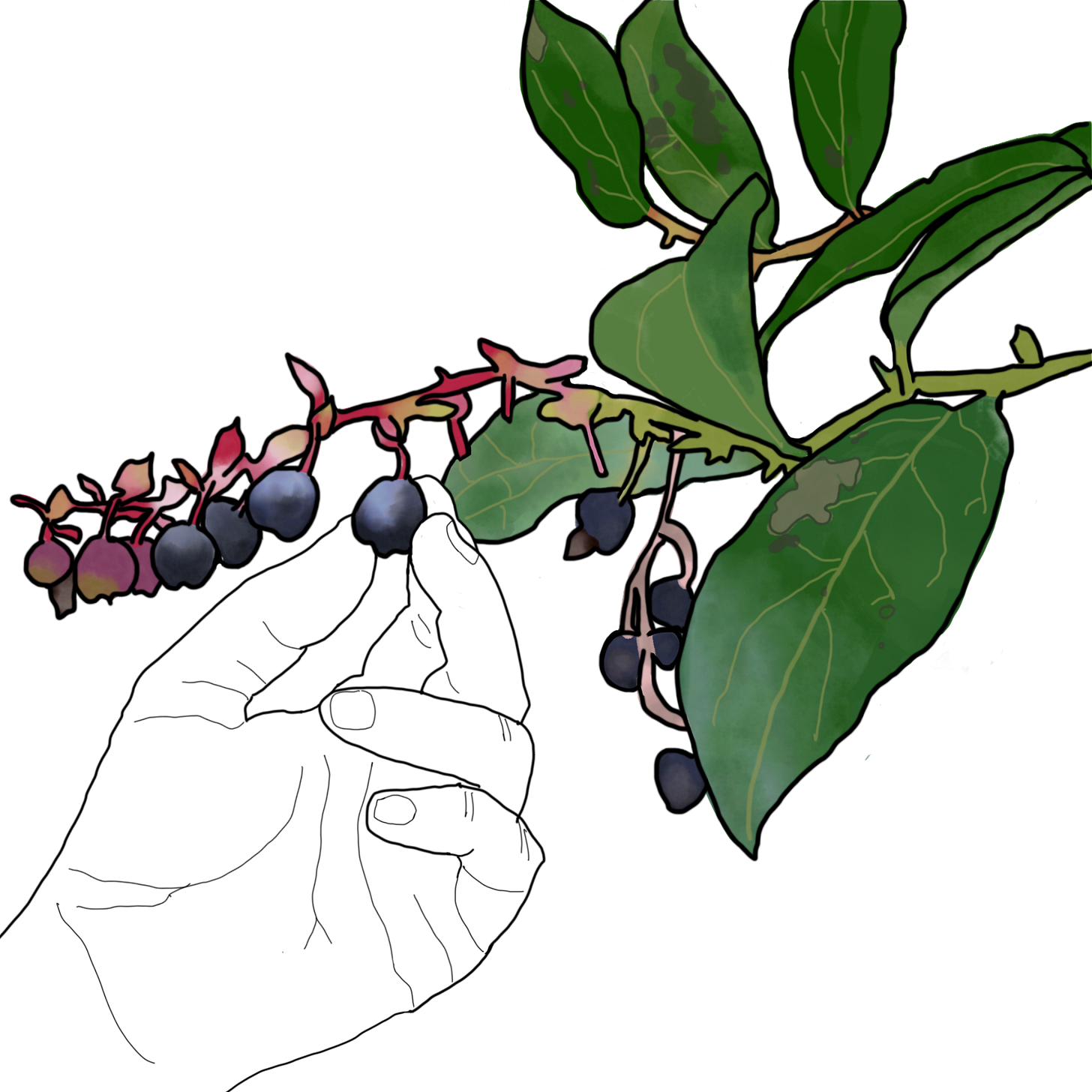Letter from the Editors: Our EARTH issue
Connect with us in our Substack chat to continue the conversation
Paid subscribers can listen to a version of this piece, read by Isabela and Zoë, on our podcast.
It’s hard to believe that it’s already April. The early days of the new year when we were just getting our EARTH issue rolling feel like yesterday. Now, flowers are coming up, the sun is setting late, and our conversations are turning to CITY, our fifth issue which will begin its release in May.
Since EARTH started, we’ve gained nearly 400 new subscribers – and we’re thrilled to have them here (if you are one of them, hello!). Along with these new faces, this issue allowed us to connect with writers, academics, and activists both near and far, and we’re extremely grateful for the connections it has seeded.
Our EARTH issue at a glance:
ḥačatakma c̓awaak (Everything is interconnected) | Isabela Vera with Charlotte Coté (podcast)
Lesbian Land | McKenzie Schwark
Sin ellas no hay maiz ni país | María Villapando (Spanish-language version coming soon!)
The Broken Promise of California Cuisine | Francis Northwood
More Radical Than It May Seem | Alice Ragland
Building Power with Black Farmer Fund | Zoë Johnson with Melanie Allen and amanda david (podcast)
BONUS: Envisioning Feminist Food Futures Through Agroecology | Lucy Harding, Dora Taylor, and Hester van Hensbergen
EARTH was a big and varied issue. Yet, as always, we were surprised and delighted by the resonances that emerged across its contributions. One theme that came up, again and again, is that of dis- and re-connection from the land — across cultures, borders, and time. In some cases, these dis- and re-connections relate to modernity: In her piece “Lesbian Land”, McKenzie Schwark talks about our present condition of absorbing nature through a screen (it resonates with an excellent piece by Barclay Bram for Vittles on the rural nostalgia of Chinese cottage-core). Francis Northwood’s “The Broken Promise of California Cuisine” unpicks the troubles of seeking to care for the Earth by voting with our forks. María Villapando meanwhile, points to the ways in which more “modern” modes of cooking (namely gas stoves) might undermine tortillera women’s connections to longstanding traditions. These connections are tied to place and central to the survival of native maize. Her piece is titled “Sin ellas no hay maiz ni país”, meaning “Without them, there is no corn nor country”, and we will be publishing a version translated into Spanish very soon.
In other pieces, disconnection from the Earth is borne of oppressive, racist forces. In a podcast interview with Isabela, titled “ḥačatakma c̓awaak (Everything is interconnected)” Dr. Charlotte Coté, Professor in the Department of American Indian Studies at the University of Washington and author of A Drum in One Hand, A Sockeye in the Other: Stories of Indigenous Food Sovereignty from the Northwest Coast, tells us about how a connection to the land, the lifeblood of Indigenous culture and community, has been disrupted by colonialism and the genocidal residential schools and describes efforts to reclaim these connections by restoring ancestral foodways. Dr. Alice Ragland’s personal essay, “More Radical Than It May Seem”, and Zoë’s podcast interview “Building Power with Black Farmer Fund” with Melanie Allen and amanda david, both explore the long history of systematically disconnecting Black people in the US from the land. This disconnection began with their forced removal from Africa and the Caribbean as part of the slave trade and continues through to the racist agricultural lending practices of today. For Alice, Melanie, and amanda, reconnecting with the land is — as it was for their ancestors — an important form of resistance against systemic racial oppression. As amanda put it in the interview, “land and our connection to land via agriculture [and] herbalism is really the root of our power.”
Shifting power, and putting land back into the hands of women, non-binary folks, and people of colour is essential to building a more just and sustainable food system. In Ecofeminism: Feminist Intersections with Other Animals and the Earth, Carol J Adams and Lori Gruen stress how ecofeminist theory gives us the tools to both expose and oppose intersecting forms of oppression. FFJ’s work has always sought to illuminate the intersections; we see them with many pieces in EARTH. In “Envisioning Feminist Food Futures Through Agroecology”, Lucy Harding, Dora Taylor, and Hester van Hensbergen reflect on how the Oxford Real Farming Conference (ORFC) has sought to be a space where we consider all the earthly relationships that maintain us. Violence by what Adams and Gruen term the “capitalist heteromasculinity” against women, people of colour, people with disabilities, the environment, and non-human animals are one and the same. The ORFC authors call for us to (re)situate ourselves in networks of justice and care that appreciate the Earth and all the life on it as our kin, and do away with extractive systems of domination. They describe how agroecology (which cannot solely be conceptualized and enacted through a Western lens) is one pathway for doing so.
The call to see ourselves as part of an inextricable web echoes that made by Animal liberation activist Harley Mcdonald-Eckersall in our interview with her last July, where she asserted that for her, “the most powerful form of solidarity is cross-movement solidarity when different groups recognize that their struggle for liberation is linked and join together across movements.” In EARTH, we see how looking at issues in a vacuum may anesthetize us to collective liberation. The lesbian back-to-the-land movements of the 1960s documented by McKenzie sequestered themselves in rural areas, creating mini-utopias where some members claimed to no longer feel the need to go out to the streets and march for equality. It was political but not all at the same time, just like today’s practices of absorbing aesthetically-pleasing sapphic videos on TikTok or, as Francis’ piece highlights, paying a pretty penny for a fancy peach picked by a famous farmer without considering how California’s other agricultural workers are going to be paid and treated fairly.
Seeing struggles for liberation as linked also allows us to acknowledge and reconcile the ways in which land (re)connection movements and aims might be conflicting. Adams and Gruen write that ecofeminist theory “stresses the need to attend to context over universal judgements.” EARTH explores how Black farming movements can be sensitive to the harms of private land ownership in capitalist settler-colonial contexts. This comes up in Alice’s piece and also Zoë’s podcast interview with Melanie and amanda. EARTH also examines how to navigate the gendered and cultural sensitivities of using firewood sustainably (this is María’s piece), how to support alternative agriculture without abandoning the fight to end the harms of the industrial model (as in Francis’), and how to create safe spaces for women to dream without disengaging from political action in support of the environment and other gender subjectivities (that’s from McKenzie).
Finally, EARTH also revealed how our connections to the land are deeply gendered. (We call her “Mother Earth” after all.) Just as we expect the soils of this planet to sustain and care for us, we have — now and throughout history — tasked women with the same. Caring for and feeding communities, including through the conversion of earth into food and medicine, takes a great deal of knowledge, skill, and ingenuity. This is knowledge and skill that has so often been passed down through generations of women, despite the ruptures of colonialism. We see this with María’s description of tortillera women in Mexico and in Alice’s essay, which highlights the wisdom of enslaved Black women in the US who, by growing food and medicine, took back a modicum of control over their cultures and bodily autonomy. It is their legacies that Alice, Melanie, and amanda are connecting to in their work fostering thriving Black agricultural systems.
We hope you took something away from these explorations of connection, resistance, and struggle – and we’d love to hear your thoughts about them. For the first time, we’re opening up our Substack chat, and hopefully, some of us will take the conversation there. If you’d like to chat with us about EARTH or FFJ in general, you just need to download the Substack app (messages are sent via the app, not email).
How to get started
Download the app by clicking this link or the button below. Chat is only on iOS for now, but chat is coming to the Android app soon.
Open the app and tap the Chat icon. It looks like two bubbles in the bottom bar, and you’ll see a row for our chat inside.
That’s it! Jump into our thread to say hi, and if you have any issues, check out Substack’s FAQ.
Next up we have CITY, coming to your inboxes in early May. Until then, we encourage you to browse our back catalogue of MILK, WAR, and SEX, and to stay tuned for our EARTH behind-the-scenes newsletter, which will be going out to paid subscribers next week.
Finally, if you’re enjoying FFJ and able to financially support us, we’d be grateful if you could consider it. Paid subscribers get access to bonus content like our behind-the-scenes, and also audio versions of most written stories (usually read by the authors themselves!). This is a great way to enjoy FFJ if you prefer podcast formats or spend a lot of time on the move. Our project is entirely funded by paid subscribers and your support is, therefore, invaluable.
Further reading:
“Race, Land, and the Law: Black Farmers and the Limits of a Politics of Recognition” (Brian Williams and Tyler McCreary, Black Food Matters: Racial Justice in the Wake of Food Justice)
“Ecofeminism: Feminist Intersections with Other Animals and the Earth” (Carol J. Adams (Anthology Editor), Lori Gruen (Anthology Editor))
Vittles Season 5: Food Producers and Production
“The rural nostalgia of Chinese cottagecore” (Barcalay Bram for Vittles, 3 April 2023)










